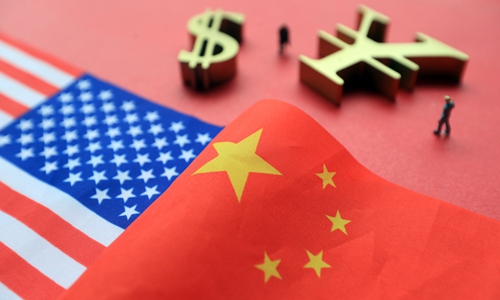HOME >> SOURCE
Foundation for Trump’s trade war shows cracks
By Wang Cong Source:Global Times Published: 2020/3/22 18:50:10
If US removes tariffs, China will respond in kind: experts

File photo
The foundation for US President Donald Trump's relentless trade war against China is starting to show cracks, as the White House seems under pressure to consider removing their punitive tariffs on Chinese imports, due to the acute blow caused by the spreading coronavirus pandemic, Chinese trade experts said on Sunday.However, while top US officials' constant finger pointing on China has soured bilateral relations, out of consideration for both the Chinese and US economies as well as the global economy, China will also likely remove its retaliatory tariffs on US products if the US does so as planned, the experts noted.
In the latest sign of the US' shifting strategy over its trade war with China, the US Trade Representative's (USTR) office announced on Friday that it was seeking public comments on lifting additional tariffs on Chinese products that could help the US to respond to the increasingly out-of-control coronavirus pandemic in the US.
The USTR did not say which products could be exempted from the tariffs, though it indicated they must be "relevant to the medical response to the coronavirus," nor did it specify a deadline for the submission of public comments. The US has already exempted tariffs on mostly medical imports from China, including masks and gloves.
"It's clear that the Americans are somehow panicked because of the heavy pressure caused by the deadly coronavirus on the [US] domestic economy and its politics," said Huo Jianguo, vice chairman of the China Society for World Trade Organization Studies in Beijing, noting that the US has been forced to reconsider its tariff war strategy.
As the coronavirus continues to spread across the US due in part to the government's woeful preparation work to blunt the virus, US stock markets have tanked and its economy is now in a big crisis, fueling calls from US businesses and some of the lawmakers for Trump administration to remove tariffs on Chinese goods.
In a letter to Trump on Wednesday, more than 100 US business organizations in sectors such as retail and apparel argued that the tariffs are actually tax levies that US businesses and consumers pay, and lifting the US' tariffs and China's retaliatory tariffs could give the US economy a reward of at least $75 billion, or 0.4 percent of US GDP.
"If the US moves to suspend all the punitive tariffs, though I think it is unlikely, China will also likely remove tariffs in response," Gao Lingyun, an expert at the Chinese Academy of Social Sciences who advises the Chinese government over trade issues, told the Global Times on Sunday. "The ball has always been and still remains in the US' court."
Gao noted that removing the tariffs in phases is also part of the phase one trade agreement reached in January and that the virus pandemic "calls for urgent actions now."
From the Chinese side, "the attitude will remain the same: if the US wants to cooperate, China will cooperate, but if the US wants to fight, then China has no other option," Huo said.
Despite major disruptions to businesses, Chinese officials have maintained they will try their best to implement the phase one deal, under which China has committed to increase purchases of US products by $200 billion over the next two years.
"There might be some short-term impact on the implementation due to the pandemic, but overall I think China can hold its side of the bargain if the US can," Gao said.
US soybean farmers are also betting on unchanged demand in China for the upcoming harvest season.
"As we near our harvest and shipping window in the fall, US farmers have optimism that China will honor the phase one trade agreement to substantially increase imports of US farm products, including soybeans," Jim Sutter, US Soybean Export Council CEO, said in a statement to the Global Times on Sunday.
Posted in: ECONOMY,CHINA-US FOCUS